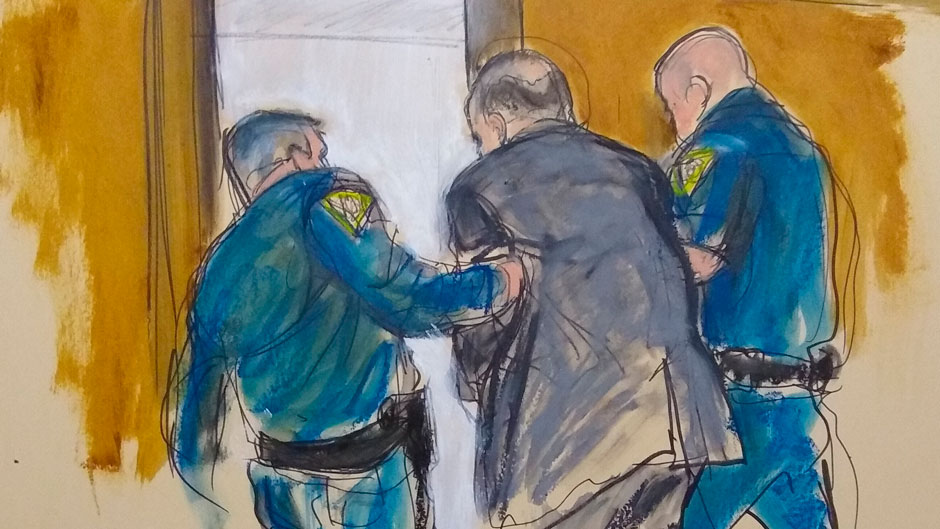Looking feeble and withered, he was led out of the courtroom in handcuffs, his weeks-long sexual assault trial finally at an end.
The verdict: guilty of rape and a criminal sexual act.
Now, Harvey Weinstein, the powerhouse Hollywood film producer whose trial in State Supreme Court in Manhattan is being called a watershed moment for the #MeToo movement, faces up to 29 years in prison.
The jury acquitted the 67-year-old on the most serious charges—two counts of predatory sexual assault and one count of first-degree rape, which could have sent him to prison for the rest of his life.
The women who accused Weinstein of sexual assault and harassment, as well as feminists around the country and in academia, hailed the guilty verdict on Monday, taking to social media and the airwaves to voice their opinions.
The verdict is important for the #MeToo movement because it shows that “even prominent men are not above the law,” said Louise K. Davidson-Schmich, a professor of political science at the University of Miami who holds a dual appointment in UM’s Gender and Sexuality Studies program.
“The success of the accusers was particularly notable because of the ongoing personal and professional relationships between Weinstein and his victims,” she said. “It indicates legal recognition that sexual assault can occur in many contexts and is not limited to easier-to-prosecute situations, such as attacks by strangers on victims who physically resist.”
But the case and those of other influential individuals like Weinstein also “highlight the ways in which powerful people can shut down investigations by attacking their accusers and by influencing the decision-making of elected prosecutors,” said Donna Coker, a professor of law and Dean’s Distinguished Scholar at the University of Miami School of Law, whose scholarship focuses on criminal law, gender, and race inequality.
“This is a problem that is not limited to sexual assault cases, though these cases may be particularly vulnerable to this kind of manipulation,” she said. “In the many sexual assault cases where there is little physical evidence, the case will turn on the credibility of the alleged victim, making attacks on the victim’s credibility particularly important to the defense.”
Indeed, during the trial, Weinstein’s defense attorneys portrayed one of his accusers as an opportunist, not a victim, saying she used her relationship with the movie producer to make connections and get acting roles in Hollywood.
“In the more common cases—those not involving a celebrity—you find predictable patterns,” said Coker, a nationally recognized expert on intimate partner violence. “Women of color, particularly poor women, women perceived to be drug-involved, women perceived to be sex workers—they are treated with little regard by law enforcement.”
Such cases, she said, are seldom investigated, and when they are, they are often dropped because of systemic race, gender, and class bias.
But to focus on the difficulty in prosecuting such cases fails to acknowledge another important circumstance, said Coker.
“Many of Weinstein’s victims did not report him initially both because they feared they wouldn’t be believed and because of the real harm he could do to them,” she explained. “In the more common case of sexual assault, the person who committed the assault is a friend, lover, or ex-lover, or part of the victim’s social circle. Many survivors of these and other sexual assaults do not want to make a criminal report because they do not want the person who harmed them to go to prison. What they want is for that person to acknowledge what they did and a reason to believe that he, or she, won’t do it again. For these victims, restorative justice and other means of holding someone accountable that are not focused on incarceration provide better responses.”
The disgraced movie mogul’s legal troubles are far from over. He still faces charges in Los Angeles, where prosecutors have accused him of sexually assaulting two women at hotels in Beverly Hills seven years ago. Could Monday’s guilty verdict in New York be used against him at his Los Angeles trial? “Yes and no,” said Coker.
“Formally, his conviction in New York should not have any effect on separate charges in Los Angeles,” she explained. “Our system of justice is designed to require that the state prove that the defendant did the crime for which he is charged, not that he is a ‘bad person’ who should be found guilty, even if the state fails to prove that he did the crime for which he is charged.”
But state and federal evidence rules make an exception in sexual assault cases, Coker pointed out. “This exception allows the prosecutor to bring in testimony of the defendant’s alleged prior sexual assault of other people to prove that he is the kind of person who sexually assaults someone,’’ she stated. “For this evidence to be admissible, it is not necessary that he was convicted of the other assault. The evidence would be admissible even if he had never been charged with the prior assault.”
Weinstein is scheduled to be sentenced on March 11.

